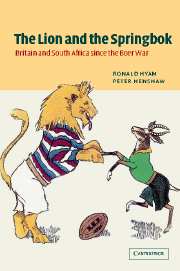Book contents
- Frontmatter
- Contents
- List of illustrations
- List of tables
- Preface
- Acknowledgements
- List of abbreviations
- 1 The uneasy special relationship: dynamics and divergencies
- 2 Breakdown: into war, 1895–1899
- 3 Post-war: the myth of magnanimity, 1905–1907
- 4 African interests and the South Africa Act, 1908–1910
- 5 ‘Greater South Africa’: the struggle for the High Commission Territories, 1910–1961
- 6 The economic dimension: South Africa and the sterling area, 1931–1961
- 7 Britain, the United Nations, and the ‘South African disputes’, 1946–1961
- 8 The political consequences of Seretse Khama and Ruth, 1948–1952
- 9 Containing Afrikanerdom: the geopolitical origins of the Central African Federation, 1948–1953
- 10 Strategy and the transfer of Simon's Town, 1948–1957
- 11 The parting of the ways: the departure of South Africa from the Commonwealth, 1951–1961
- 12 Enfeebled lion? How South Africans viewed Britain, 1945–1961
- 13 Springbok reviled: some British reactions to apartheid, 1948–1994
- Epilogue The relationship restored: the return of the new South Africa to the Commonwealth, 1994
- Select bibliography
- Index
Epilogue The relationship restored: the return of the new South Africa to the Commonwealth, 1994
Published online by Cambridge University Press: 03 December 2009
- Frontmatter
- Contents
- List of illustrations
- List of tables
- Preface
- Acknowledgements
- List of abbreviations
- 1 The uneasy special relationship: dynamics and divergencies
- 2 Breakdown: into war, 1895–1899
- 3 Post-war: the myth of magnanimity, 1905–1907
- 4 African interests and the South Africa Act, 1908–1910
- 5 ‘Greater South Africa’: the struggle for the High Commission Territories, 1910–1961
- 6 The economic dimension: South Africa and the sterling area, 1931–1961
- 7 Britain, the United Nations, and the ‘South African disputes’, 1946–1961
- 8 The political consequences of Seretse Khama and Ruth, 1948–1952
- 9 Containing Afrikanerdom: the geopolitical origins of the Central African Federation, 1948–1953
- 10 Strategy and the transfer of Simon's Town, 1948–1957
- 11 The parting of the ways: the departure of South Africa from the Commonwealth, 1951–1961
- 12 Enfeebled lion? How South Africans viewed Britain, 1945–1961
- 13 Springbok reviled: some British reactions to apartheid, 1948–1994
- Epilogue The relationship restored: the return of the new South Africa to the Commonwealth, 1994
- Select bibliography
- Index
Summary
Whoever slipped ‘Land of hope and glory’ into the programme of music played at the inauguration of Nelson Mandela as president of South Africa can have had no idea of the anthem's message, no sense of political correctness, or else a wry sense of humour. For it was not merely the tune of this, the most unashamedly jingoistic of all British ceremonial music, that was played for the dignitaries assembling in the amphitheatre of Pretoria's Union Buildings on 10 May 1994. The South Africa Navy band (who, immaculately turned out in their summer whites, looked as though they could have stepped off a Royal Navy cruiser in 1910 to mark the establishment of the Union of South Africa) had their leading soloist sing the verse lyrics as well as the rousing chorus. Indeed, the event was very much one in the English social tradition: a day in the stewards' enclosure at the Henley royal regatta or a garden party at Buckingham Palace, the proceedings too well rehearsed, too much like a gathering of Edwardian high society, unconcerned by social realities carefully hidden from view by more than four terrible decades of apartheid social engineering. This resurgent Englishness effortlessly supplied alternative rituals long suppressed, much in the manner of Russian Orthodoxy which made itself available after the collapse of communism.
- Type
- Chapter
- Information
- The Lion and the SpringbokBritain and South Africa since the Boer War, pp. 343 - 350Publisher: Cambridge University PressPrint publication year: 2003



